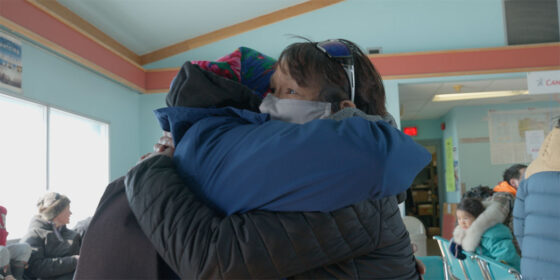TIFF 2023 | Tautuktavuk (What We See) (Carol Kunnuk & Lucy Tulugarjuk, Canada) — Discovery

By Madeleine Wall
A docu-fiction hybrid scripted entirely in Inuktituk, Tautuktavuk is the most recent Isuma Collective production, another stand-out in their radical practice of filmmaking. Directors Carol Kunnuk and Lucy Tulugarjuk, who are real-life cousins, play sisters Uyarak (Tulugarjuk) and Saqpinak (Kunnuk). Separated by land and lockdown, these women must cross real and virtual distances to try to rebuild their past.
Rather than being a COVID film, the distance created by COVID restrictions becomes Tautuktavuk’s structuring principle. We see the siblings speak to each other over Zoom, close but distanced, and it is in this in between space that Uyarak, living in Montreal, opens up to her older sister back home in Igloolik. In the isolation of lockdown, Uyarak has had traumatic memories resurface, specifically of being sexually assaulted by priests in her village when she was a child. She is able to seek counselling in Montreal, but needs her sister as a witness. Saqpinak is able to fill in what her sister has forgotten, the context that she was missing. But healing is not easy, and the sisters yearn to see each other in person.
The narrative is fictional, but with details drawn from the filmmakers’ lives, and from the lives of people around them; Uyarak discusses working on Atanarjuat (in which Tulugarjuk played a featured role), while Saqpinak appears on a TV show similar to the one hosted by Kunnuk. Both women find solace in their Inuit traditions; we see Saqpinak interviewing elders and filming community events, and Uyarak receiving tattoos to celebrate becoming a grandmother. As the seasons change, the Igloolik skyline shifts beneath the all-bleaching white sun; as restrictions lift, Uyarak is able to return to Igloolik, to learn more about her abuse, her culture, and a secret her sister has been hiding from her.
In Tautuktavuk, healing from trauma can only happen within a community. The two sisters lean on each other despite their distance, two parts of a whole. Uyarak’s return involves her making amends with her family, and coming to terms with the limitations of her parents. There is no single moment of healing, what has been done to them will always have happened to them, and life must continue on, beyond their trauma. The sense of care radiates from a filmmaking practice rooted in community, with a clear sense of responsibility towards women who are rarely in front of the camera, let alone behind it.
Madeleine Wall- « Previous
- 1
- 2


